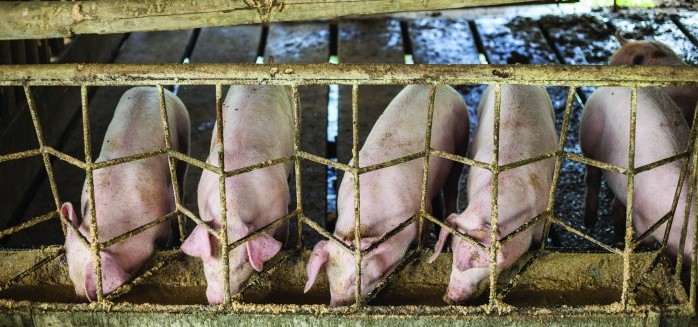Chinese pig prices are rising rapidly as African swine fever takes its toll on production within the world’s largest pig herd.
Prices reached their highest levels in 14 months on Monday and look set to keep rising after weeks of gains, according to the Reuters news agency.
Live hog prices in major consumption and production areas were up by 7% on average on Monday compared with last Friday to 15.09 yuan ($2.24) per kilogram, according to data provided by consultancy China-America Commodity Data Analytics. Even though demand is typically weak at this time of year, prices across the country have increased by almost 20% since early March, the report added.
“The main reason (for rising prices) is there are fewer pigs,” said Yao Guiling, analyst with China-America Commodity Data Analytics. The situation is being exacerbated as some farmers are also reluctant to sell now in the belief that further tightening of supplies will lead to even higher prices in coming weeks.
“Pig production capacity has been falling in the past two years, then in the second half of last year, African swine fever outbreaks further affected restocking, pushing up prices,” she said.
Some farmers have given up production after government measures to tackle the disease, which hit China in August 2018, initially pushed prices too low and, with the imposition of live movement restrictions, made trade impossible.
There have now been 111 confirmed cases in 28 provinces and regions across the country, with about 1 million pigs slaughtered as the authorities seek to control its spread.
China’s pig herd was 13% in January compared with the same month a year earlier, while the number of breeding sows was down 15% from the previous year, according to data from the Ministry of Agriculture and Rural Affairs.
This rationalising of the pig herd means farmers that can keep free of the disease believe they could be in line for bumper profits in coming months. “Our goal is to survive. If we survive, life afterwards will be good,” said a manager at a major pig producer located in one of the regions that has reported an African swine fever outbreak.
Shares in leading pig farming companies continued to rise on Monday, as investors bet on tightening pork supplies and strong government support for leading producers. Wens Foodstuff Group Co was up 4%, while rapidly growing Tech-bank Food Co was up 3%.
An article on the March issue of Pig World looks at the potential global implications of China’s battle with ASF. Rabobank forecasts that pork production in China could drop by as much as 20% in 2019, while Global food consultancy Gira forecasts a 7% decline. This is expected to lead to a strong rise in Chinese domestic pork prices and higher import demand, which is likely to absorb any ‘surplus’ product on the global market.
However, the shortfall in Chinese pork supplies and higher prices will also result in Chinese consumers switching to other meats and proteins, Gira added.
AHDB analyst Beth Wilkins highlighted the potential export opportunities for the UK and others. With China producing over 50 million tonnes of pig meat a year, a 5% fall in production, would equate to a supply gap in excess of 2.5mt. China imported around 2mt of pork and offal in 2018.
“But in reality, global supply availability and competition with other meats is likely to limit the level of trade,” she added.




